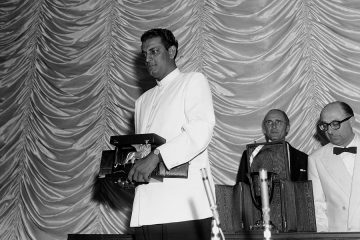Peter Rainer in The Christian Science Monitor:
 Of the films of the great Indian director Satyajit Ray, the Japanese master Akira Kurosawa once said that not having seen them “is like never having seen the sun or the moon.” I completely agree. For me, Ray is perhaps the finest of all film artists. The humanism of his vision, and the lyricism he brings to it, is overwhelming. No other director has so consistently expressed what it means to be alive. No other filmmaker, male or female, has explored with such profound grace and understanding the inner lives of women. I had the honor in the fall of 2008 to be invited to Kolkata, India, to lecture to local students and film societies about his work. As a white Westerner, I was wary of coming across like some sort of postcolonial know-it-all. I needn’t have worried. Our shared love for Ray dissolved any barriers. I was accompanied by a member of the Academy of Motion Picture Arts and Sciences who was instrumental in the ongoing restoration of Ray’s films, many of which were in a state of disrepair. (Ray was awarded an honorary Oscar in 1992, shortly before his death.)
Of the films of the great Indian director Satyajit Ray, the Japanese master Akira Kurosawa once said that not having seen them “is like never having seen the sun or the moon.” I completely agree. For me, Ray is perhaps the finest of all film artists. The humanism of his vision, and the lyricism he brings to it, is overwhelming. No other director has so consistently expressed what it means to be alive. No other filmmaker, male or female, has explored with such profound grace and understanding the inner lives of women. I had the honor in the fall of 2008 to be invited to Kolkata, India, to lecture to local students and film societies about his work. As a white Westerner, I was wary of coming across like some sort of postcolonial know-it-all. I needn’t have worried. Our shared love for Ray dissolved any barriers. I was accompanied by a member of the Academy of Motion Picture Arts and Sciences who was instrumental in the ongoing restoration of Ray’s films, many of which were in a state of disrepair. (Ray was awarded an honorary Oscar in 1992, shortly before his death.)
…Trying to whittle down the director’s oeuvre to a couple of movies is like picking out a couple of plays by Shakespeare. I’ve seen most of Ray’s 29 feature films, and I’m not being sentimental or starry-eyed when I say that he has the highest batting average of any major film director. The vast majority of his output is extraordinary but I will highlight here his most famous contribution, The Apu Trilogy. I consider it the finest linked series of films ever made. (Ravi Shankar composed the beautiful music.) They stand on their own but for maximum effect must be seen in order. Never having directed a movie before, Ray began his career in 1955 with “Pather Panchali (Song of the Little Road)” (unrated), derived from a classic novel about rural Bengali life and its impoverishments. The focus is on little Apu and his family, and it conveys like no other movie the sense of liberation one gets from breaking free, however momentarily, from the restraints of such a world. A sequence where Apu and his older sister Durga race across the fields to glimpse a distant train – a symbol of a faraway realm – takes you to the limits of feeling.
More here.
